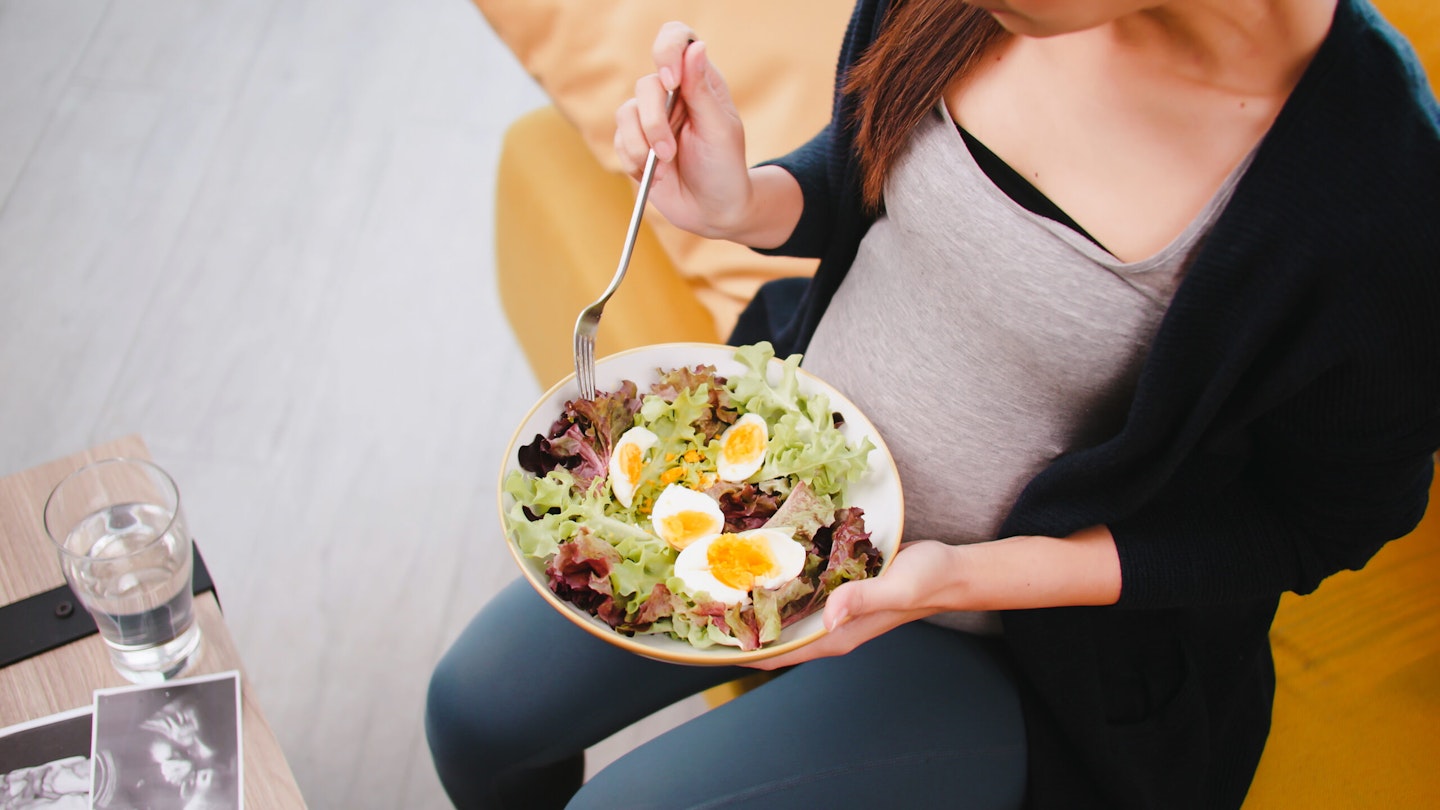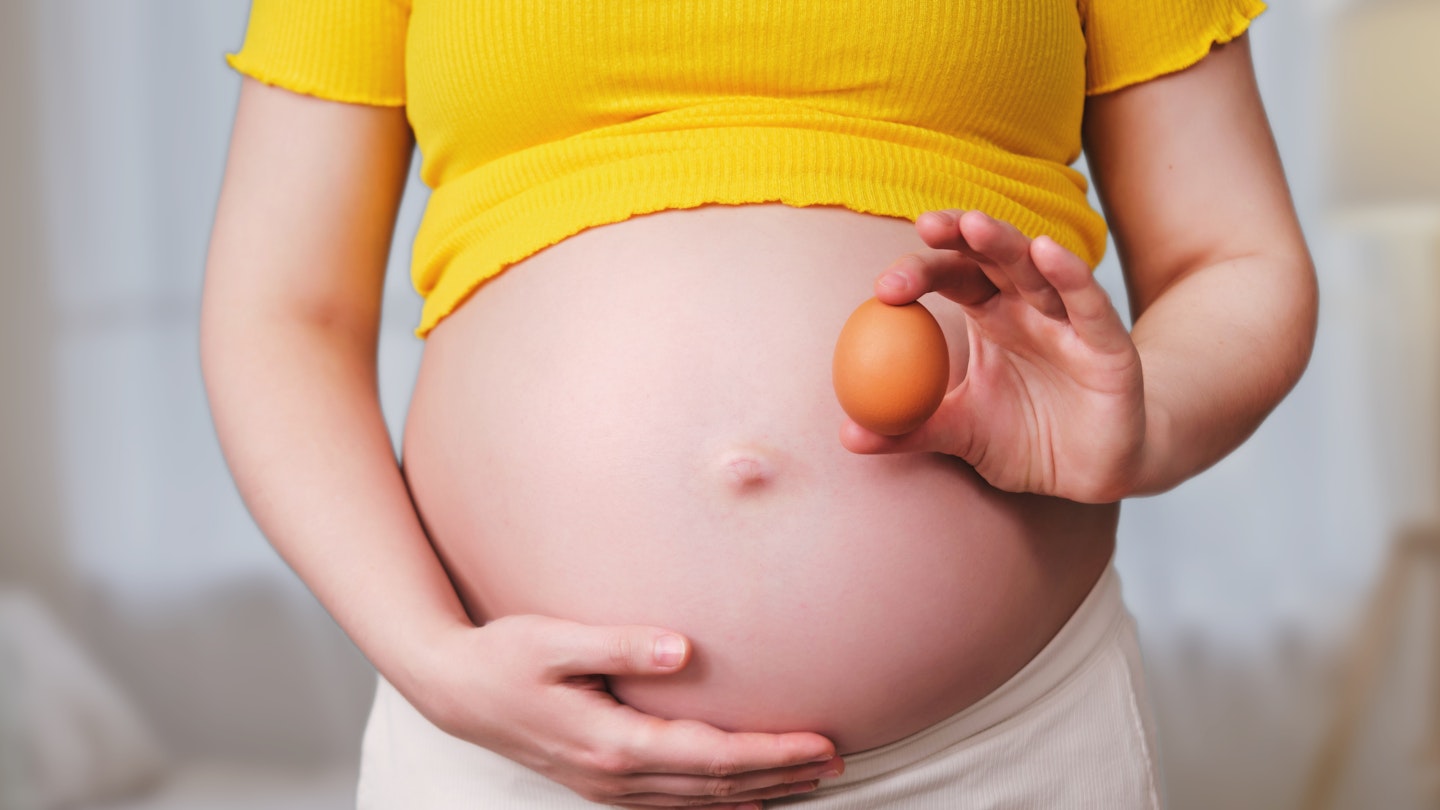In the early stages of your pregnancy journey, your changing hormones can affect the foods you normally enjoy, through developing cravings or aversions. At the same time there are certain foods that you're advised to avoid during pregnancy, to help protect you and your developing baby.
This leads to a list of foods you question each time you plan out your meals for the week or try to pick a dish from a menu. And at some point, you've probably questioned whether you can eat runny eggs in pregnancy, or maybe even eggs in general.
According to NHS midwife and My Expert Midwife specialist Malena Monteverde, "One of the most common questions midwives get asked when we first meet a pregnant woman for her booking appointment is 'can you eat eggs when pregnant?', and the answer is always received with relief: 'Yes, you can!'"
Are eggs safe in pregnancy?
"Eggs are not only safe to eat in pregnancy but, because of their nutritional value, they are considered a very healthy food for pregnancy, and one that we actively recommend.", says Malena. However, if you're travelling to the US, or live there, the advice on eating eggs in pregnancy differs. While it's safe in most cases in the UK, in the US, the FDA advises avoiding all undercooked or uncooked eggs.

Why eggs are great for pregnant women
Egg-cellent nutrition
Eggs contain protein, vitamin D and vitamin B12, as well as vitamins B2 & B5 and choline, a nutrient that supports memory and mood.
Protein
A healthy intake of protein is essential for your baby’s growth in pregnancy, as it is with protein that new muscles, organs and bones are built.
Eggs are a great source of protein and because your protein requirements increase as your pregnancy progresses, eating several eggs throughout the week is an easy and economical way to meet your protein needs.
Protein can also be obtained from animal meat and from plants. As well as eggs, good sources include poultry, fish, lean meat, beans and legumes, soy products, quinoa, nuts and seeds and, in smaller quantities, in some vegetables.
Vitamin D
Vitamin D is essential in pregnancy, as it helps calcium to be absorbed into bones, teeth and muscles, building your baby’s skeleton and protecting muscle strength. It is also instrumental during preconception and post-birth for your bone health, your emotional well-being and your immune system.
We produce vitamin D in our bodies from exposure to sunlight (weather and lifestyle permitting), but it can also be obtained from foods, and egg yolks are a good source. Other food sources of vitamin D include oily fish (sardines, salmon, trout), some mushrooms, fortified dairy and plant milks, cheese and poultry.
During pregnancy, your need for vitamin D increase and these higher requirements are difficult to meet with just foods and (hopefully) sunshine. This is why the Department of Health recommends that all pregnant women take pregnancy vitamins, such as My Expert Midwife’s Women pre-conception + pregnancy supplement, containing 10 micrograms (4000iu) of vitamin D. Look out for a supplement that also includes folic acid (as folate), vitamin B12 and other essential micronutrients.
Vitamin B12
Eggs also contain vitamin B12, a micronutrient that is thought to be as essential as folate (folic acid) for the development of your baby’s brain and neural tube. Vitamin B12 also plays a vital role in the formation of healthy red blood cells, in making DNA and in the maintenance of a healthy nervous system. A deficiency in this vitamin can lead to anaemia, so it is important to take enough through your diet.
Other good sources of vitamin B12 that are safe in pregnancy also include oily fish such as mackerel, Atlantic herring, canned sardines, trout and salmon, meat such as steak, beef in different forms and lamb shank, fortified breakfast cereals, fortified plant milks (coconut, almond, soy, rice), semi-skimmed milk and low-fat yoghurt.
When to avoid eggs in pregnancy?
While pregnant women used to be advised to avoid runny eggs, this changed in 2016 with new advice from the Food Standards Agency, based on research from the Advisory Committee on the Microbiological Safety of Food. It's now advised that pregnant women can eat runny eggs as long as they have the Red Lion stamp. You should still avoid eating raw or undercooked eggs in any form unless they have this mark.
If you are eating out or do not know where the eggs have come from, make sure to only eat eggs where both the yolk and the white have been thoroughly cooked through.
Unless they are completely cooked through, eggs without the Red Lion stamp could contain a bacteria called salmonella. Although salmonella will rarely cause harm to your developing baby, it can cause you severe vomiting and diarrhoea. So, avoid foods containing raw or undercooked eggs, such as tiramisu, mousse or homemade mayonnaise when eating out.
The good news is that, if you are certain that the eggs being used have the Red Lion stamp, you can have ‘runny’ eggs and foods where the eggs may not be thoroughly cooked through, such as quiche, mousse, meringue and homemade sauces such as hollandaise. Supermarket foods will generally be made using pasteurised eggs so should be safe to eat.

Including eggs in your diet
Eggs are a very easy and versatile food, which makes including them in your diet pretty simple and straight-forward.
Here are some ideas on how to eat more eggs:
• Have them for breakfast - you can eat poached eggs, scrambled eggs or, for a naughty treat, fried eggs, when you're pregnant. Eating eggs for breakfast will also help to stave off sugar slumps later on in the day.
• Make omelettes, frittatas and Spanish tortilla – you can eat them hot, cold, have them in a sandwich or have the leftovers as a satisfying snack. If you add eggs, cheese or some meats or fish, you’ll also be getting a good mix of fibre, vitamins and minerals with your protein!
• Add hard-boiled eggs to salads or have one (or two!) on its own as a snack.
• Prepare an egg sarnie for a filling lunch.
If nausea and sickness mean you struggle to eat eggs in your first trimester, don’t worry, you will actually reap most of their benefits during your second and third trimesters.
What is the Red Lion Stamp?
The Red Lion Stamp is part of the British Lion scheme, which was launched in 1998 and is the UK’s most successful food safety scheme, responsible for a huge reduction in the cases of salmonella in UK eggs. Over 90% of UK eggs are now produced under this scheme, meaning they're produced under stringent requirements to ensure the highest standards of food safety. This is why the Food Standards Agency changed their advice in 2016 to confirm that eggs with the Red Lion Stamp are approved to be eaten runny, or even raw, by vulnerable groups.
About the Expert
Malena Monteverde is a midwife, maternity ward co-ordinator and community midwife. She is passionate about postnatal care and recovery for women after childbirth, and an avid advocate for women’s rights and choices throughout their childbearing experience (and beyond). At My Expert Midwife Malena continues to pursue her passion for supporting women and families through pre-conception, pregnancy, and into the postnatal period through expert blogs, social media content and antenatal classes.
Adejumoke Ilori is a Commercial and Content Writer for Mother&Baby. She is a mommy of one and enjoys writing about baby world, mothership, true life stories (especially single parenthood), and celebrity gossip. With a degree in Creative Writing, she has also worked with media platforms like, OK! Magazine, New, She Rose Revolution and Fab Magazine.
